冀教版六年级下英语课文翻译
六年级下册英语冀教版第一课课文翻译
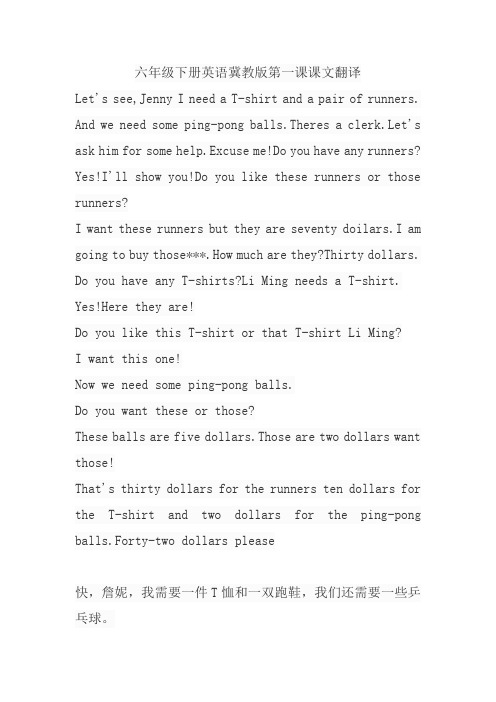
六年级下册英语冀教版第一课课文翻译Let's see,Jenny I need a T-shirt and a pair of runners. And we need some ping-pong balls.Theres a clerk.Let's ask him for some help.Excuse me!Do you have any runners? Yes!I'll show you!Do you like these runners or those runners?I want these runners but they are seventy doilars.I am going to buy those***.How much are they?Thirty dollars. Do you have any T-shirts?Li Ming needs a T-shirt. Yes!Here they are!Do you like this T-shirt or that T-shirt Li Ming?I want this one!Now we need some ping-pong balls.Do you want these or those?These balls are five dollars.Those are two dollars want those!That's thirty dollars for the runners ten dollars for the T-shirt and two dollars for the ping-pong balls.Forty-two dollars please快,詹妮,我需要一件T恤和一双跑鞋,我们还需要一些乒乓球。
店员在这里,让我们向他寻求帮助。
打扰一下,你这有跑鞋吗?有。
六年级下册英语17课课文冀教版

六年级下册英语17课课文冀教版全文共3篇示例,供读者参考篇1Unit 17: A trip to the countryIt was a beautiful Saturday morning and our class was headed to the countryside for a field trip. We were all excited as we boarded the bus and set off on our journey. The weather was perfect – the sun was shining brightly and there wasn't a cloud in the sky.As we got closer to our destination, we could see the lush greenery and rolling hills of the countryside. The bus came to a stop at a small farm, where the farmer greeted us warmly and showed us around. We saw chickens running around, cows grazing in the fields, and even some adorable lambs frolicking about.Our first activity was a nature walk through the fields and forests. We spotted all sorts of wildflowers, butterflies, and birds along the way. Our guide pointed out different plants and taught us about the importance of preserving nature.After the nature walk, we had a picnic by a picturesque lake. We enjoyed sandwiches, fruit, and juice while taking in the stunning scenery around us. Some of us even went for a swim in the cool, refreshing water.In the afternoon, we visited a nearby village and got to meet some of the local residents. They were friendly and welcoming, and some of them even invited us into their homes to show us how they lived. It was a great opportunity to learn about rural life and culture.As the day came to an end, we gathered around a bonfire and sang songs while roasting marshmallows. It was a perfect end to a perfect day in the countryside.On the bus ride back to school, we were all buzzing with excitement and talking about our favorite moments of the trip. We couldn't stop smiling as we recalled the beautiful sights and experiences we had shared.The trip to the country was a memorable one, and it taught us the importance of connecting with nature and appreciating the beauty that surrounds us. We felt grateful for the opportunity to explore the countryside and create lasting memories with our classmates. It was a day we would never forget.篇2Lesson 17 in the sixth grade English textbook of Jilin Education Edition is titled "My Trip to Beijing". In this lesson, students learn about the features of Beijing, the capital city of China, as well as the famous attractions and cultural landmarks that can be found there.The lesson begins with a brief introduction to Beijing and its importance as a cultural and historical center in China. Students are then introduced to some of the most famous sights in Beijing, such as the Great Wall, the Forbidden City, and the Temple of Heaven.The lesson also covers some basic vocabulary related to travel and tourism, such as "hotel", "ticket", "tourist" and "souvenir". Students are encouraged to practice using this vocabulary in a variety of contexts, such as asking for directions, ordering meals, and making travel arrangements.One of the key activities in this lesson is a role-playing exercise where students pretend to be tourists visiting Beijing. They are given a map of the city and asked to plan their itinerary, budget their expenses, and navigate the city using public transportation.Overall, this lesson provides students with a fun and engaging way to learn about the culture and history of Beijing, while also developing their English language skills. By the end of the lesson, students should have a better understanding of the importance of tourism and travel, as well as the diversity of attractions that can be found in China's capital city.篇3Lesson 17 of Grade 6, Book 2 of the Jilin Education Edition is titled "Enjoying the Happy Time of Youth." This lesson tells the story of a group of children who go on a field trip to a farm and have a wonderful time together. The main theme of the lesson is about the importance of cherishing our youth and the happiness that comes from spending time with friends.The story starts with the children waking up early in the morning and packing their bags for the field trip. They are all excited to spend the day outdoors and learn new things about the farm. When they arrive at the farm, they are greeted by the farmer who shows them around and teaches them about the different animals and plants on the farm.The children have a great time feeding the pigs, milking the cows, and picking fresh vegetables from the garden. They alsoenjoy playing games and running around in the open fields. As the day comes to an end, the children sit around a campfire and roast marshmallows while sharing stories and jokes with each other.Through this field trip, the children learn the value of friendship, teamwork, and appreciating the simple joys of life. They realize that happiness can be found in the little things, like spending time with loved ones and enjoying the beauty of nature.At the end of the day, the children return home with memories that will last a lifetime. They understand that youth is a time to be cherished and that happiness can be found in the moments spent with friends and family.Overall, Lesson 17 teaches us the importance of living in the present moment and enjoying the happy times of youth. It reminds us to appreciate the simple pleasures of life and to treasure the friendships that bring us joy. Let us all take a lesson from these children and remember to embrace the happiness that comes from being together with loved ones.。
六年级下册英语第10课文翻译冀教版

六年级下册英语第10课文翻译冀教版Lesson 10 Exercise1.What is exercise?(什么是锻炼?)Riding a bike is exercise.(骑自行车是锻炼。
)Walking is exercise.(步行是锻炼。
)Playing ping pong is exercise.(打乒乓球是锻炼。
)Running is exercise.(跑步是锻炼。
)Exercise helps make your body healthy and strong.(锻炼帮助你的身体保持健康和强壮。
)2.How many minutes does Danny exercise?(丹尼锻炼多少分钟?)How often do you exercise, Danny?(你多久锻炼一次,丹尼?)I walk to school in the morning,and I walk home after school.(早晨我步行去上学。
放学后我步行回家。
)That’s twice a day.How many minutes do you walk?(那就是一天两次。
你步行多少分钟?)About five minutes .(大约五分钟。
)I think you need about an hour of exercise a day,Danny!(我认为你一天需要锻炼大约一个小时,丹尼!)Okay! I'm going to watch more sports on TV!好吧!我会在电视上看更多的体育运动!No, Danny!You have to play sports for exercise!不,丹尼!你必须靠做运动来锻炼!。
冀教版六年级下册英语第九课翻译
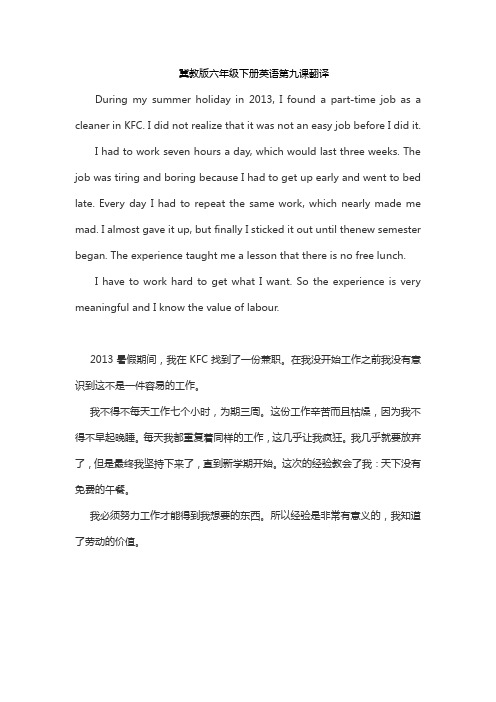
冀教版六年级下册英语第九课翻译During my summer holiday in 2013, I found a part-time job as a cleaner in KFC. I did not realize that it was not an easy job before I did it.I had to work seven hours a day, which would last three weeks. The job was tiring and boring because I had to get up early and went to bed late. Every day I had to repeat the same work, which nearly made me mad. I almost gave it up, but finally I sticked it out until thenew semester began. The experience taught me a lesson that there is no free lunch.I have to work hard to get what I want. So the experience is very meaningful and I know the value of labour.2013暑假期间,我在KFC找到了一份兼职。
在我没开始工作之前我没有意识到这不是一件容易的工作。
我不得不每天工作七个小时,为期三周。
这份工作辛苦而且枯燥,因为我不得不早起晚睡。
每天我都重复着同样的工作,这几乎让我疯狂。
我几乎就要放弃了,但是最终我坚持下来了,直到新学期开始。
这次的经验教会了我:天下没有免费的午餐。
我必须努力工作才能得到我想要的东西。
所以经验是非常有意义的,我知道了劳动的价值。
[六年级下册英语课文翻译冀教版]六年级下册英语课本翻译
![[六年级下册英语课文翻译冀教版]六年级下册英语课本翻译](https://img.taocdn.com/s3/m/049249c510a6f524cdbf8550.png)
[六年级下册英语课文翻译冀教版]六年级下册英语课本翻译unit1教材第2页课文翻译l"m 21 metres tall.l"m the tallest!我身高21米。
我是的!l"m 1.6 metres tall.l"m taller than this dinosaur.我身高1.6米。
我比这只恐龙高。
lt"s so tall!它如此高!Some dinosaurs are bigger than houses.Some are smaller than our schoolbags.一些恐龙比房子大。
一些比我们的书包小。
2unit1教材第3页课文翻译How heavy is it?它体重多少?lt"s five tons.它五吨。
What size are your shoes?你穿多大号的鞋?My shoes are size 35.我穿35号的鞋。
let"s try部分翻译The children areIn the museum. Listen and cirde.孩子们在博物馆里。
听一听圈一圈。
l.The first dinosaur eats__.1.第一只恐龙吃____。
A.vegetables A.蔬菜B.meat B.肉2.The ___ dinosaur is taller.2.___恐龙更高。
A first A.第一只B.second B.第二只2let"s talk部分翻译Zhang Peng:Look!That"s the tallest dinosaur in this hall.张鹏:看!那是这个厅里的恐龙。
Mike:Yesit is.How tall is it?迈克:是的它是。
它有多高?Zhang Peng:Maybe 4 metres.张鹏:可能4米。
Mike:Wow!It"s taller than both of us together.迈克:哇!它比我们俩加起来还高。
新冀教版六年级英语下册《Unit 3 What Will You Do This Summer. Lesson 15 Jenny.s Summer Holiday》_13

What will you do for the summer holiday, Jenny?
詹妮,今年暑假你要什么?
Jenny: My family likes to
go on trips in the
summer.
在夏天我的家人喜
欢去旅行。
like to do=like doing
线部分提问) __W__h_a_t__ will Steven __d_o_____ for the summer holiday? (3)I watched the ships on the sea last summer.(将last改为 next,然后改写句子) I __w_i_ll____ _w__a_tc_h___ the ships on the sea next summer.
Practicing
二、按要求完成下列各题。 (1)I will play football with my friends.(改为一般疑问句)
__W__i_ll___ ___y_o_u___ play football with your friends? (2)Steven will go on a trip for the summer holiday. (对画
Learning New Words
by ship 乘船 take a ship 乘船
ship 轮船 复数 ships
Learning New Words
go on a trip 去旅行 =go on trips have a good trip 旅途愉快
trip 旅行 I will go on a trip to Hainan this summer.
冀教版六年级下英语课文翻译
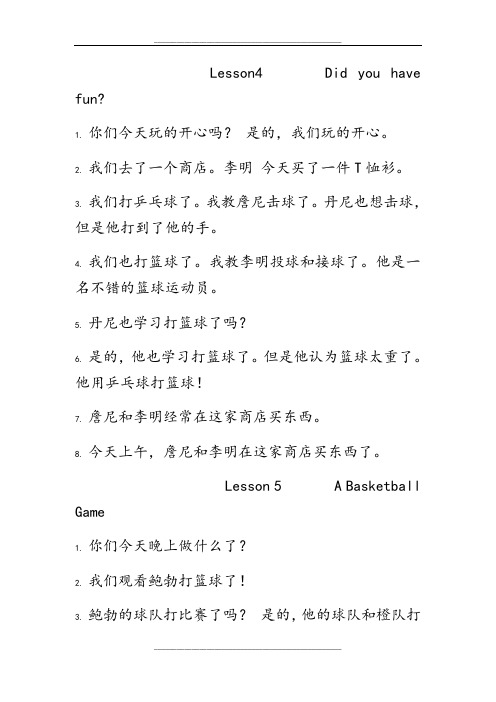
Lesson4 Did you have fun?1.你们今天玩的开心吗?是的,我们玩的开心。
2.我们去了一个商店。
李明今天买了一件T恤衫。
3.我们打乒乓球了。
我教詹尼击球了。
丹尼也想击球,但是他打到了他的手。
4.我们也打篮球了。
我教李明投球和接球了。
他是一名不错的篮球运动员。
5.丹尼也学习打篮球了吗?6.是的,他也学习打篮球了。
但是他认为篮球太重了。
他用乒乓球打篮球!7.詹尼和李明经常在这家商店买东西。
8.今天上午,詹尼和李明在这家商店买东西了。
Lesson 5 A Basketball Game1.你们今天晚上做什么了?2.我们观看鲍勃打篮球了!3.鲍勃的球队打比赛了吗?是的,他的球队和橙队打的比赛。
那是一场非常好的比赛。
每个人都努力地打。
4.谁赢了?鲍勃的球队赢了。
5.你们玩的开心吗?是的。
我们为鲍勃的球队呐喊!6.鲍勃每天都打篮球吗?不,他是一名警察。
他在星期六和星期日打篮球娱乐。
7.他今天晚上打的那么好。
他是一名不错的运动员。
Lesson7 Always Have Breakfast1.每个人都想变得健康和强壮。
我们怎样才能变得健康和强壮呢?首先,一直吃早餐。
它对你们有好处!2.上周丹尼和金姆多久吃次早餐?上周丹尼吃了一次早餐。
他什么时候吃的早餐?3.上周金姆吃了六次早餐。
做的好,金姆!4.你一直吃早餐吗?是的。
我一直吃早餐。
Lesson 8 Always Brush Your Teeth!1.李明在早上7点吃早餐。
早餐前,他洗手并刷牙。
早餐后,他去上学。
2.丹尼晚餐后从不刷牙。
那对他的牙齿有害。
3.詹尼一周去上学五次,从星期一到星期五。
4.他早上7点起床。
首先,她洗手和脸,然后她刷牙。
接下来,他吃早餐。
然后他去上学。
她在学校努力学习。
星期六和星期日十不同的。
詹尼在那些天不去上学。
5.早餐前你做什么?我刷牙6.为什么?因为我想要兼顾健康的牙齿。
Lesson9 Eat More Vegetables and Fruit1.丹尼多久吃一次水果和蔬菜?让我们看一看。
六年级英语下册第23课冀教版

You should know it !
How far…?(询问距离) It’s+数字+长度单位(回答) How far is the park ? It’s 500 metres. How long …?(询问时间的长度,或事物的长 度) It’s +数字+长度或时间单位 How long is an English class? It’s 45 minutes. How long is the line? It’s 3metres.
it’s time to do sth
a little
1.表示一点,有点
she is a little sad.
I have a little water./
2.表示一个小的。。。
This is a little dog.
This is for you.(表示在送给别人礼物,复 数可用these are for you) This is for you and that is for Danny.
Have a good trip! 旅途愉快! Don't forget to write! 不要忘记写信! Good-bye! 再见!
Let's sing!让我们唱一唱! It'stime to say good-bye. 该说再见了。 Good-bye.Good-bye.Good-bye. 再见。再见。再见。 Don't forget to phone me,my friends. 不要忘记给我打电话,我的朋友们。 It's time to say good-bye.
It’s time to say good-bye. 到说再见的时候了。
冀教版英语六年级下册 Lesson 4 Did You Have Fun 课件

易错答疑
He didn’t his homework.正
确吗?
错误。 didn’t 后加原形动词 He didn’t do his homework.
课外拓展
Where did you go?
古人说:读万卷书,行万里路。 你曾经去过那里?“世界那么大, 我想去看看。“人在旅途,背上自 己的行囊,勇敢的迈出自己的步伐, 为了远方那高山流水的美景。为了 远方那诱人心魄的美妙体验,为了 远方那难求的丰盛美食。
含实义动词的一般过去时没有人称和数的变化, 句子中的动词一律用过去式。
典型例题
I bought some books yesterday. (改为否定句) I ____d_i_d_n_’t__b_u_y_a_n_y_b_o_o__ks_______ yesterday.
知识精讲
thought /θɔːt/ v. 想;认为(think的过去式) 例句: Danny thought the basketball was too heavy.
知识精讲
have fun 玩得高兴 同义短语: have a good time; enjoy oneself
例句: The children are having fun. 孩子们正玩得高兴。
典型例题
用所给单词的适当形式完成句子。 ___D_i_d___ they ___s_e_e___ (see) the film last night? 选出能替换画线部分的选项。 Did you have a good time last Sunday? A. have fun B. have a fun C. have funny
重点呈现
9. This afternoon, they taught each other a sport. 今天下午,他们相互教运动。
六年级下册冀教版英语书第,十九课翻译

六年级下册冀教版英语书第,十九课翻译Daming: Look! The new clubs for this term are on the board.I'd like lo join the Music Club because I can play the piano.What about you,Betty?大明:看!本学期的新社团在布告栏里了。
我想参加音乐社团,因为我会弹钢琴。
你呢,贝蒂?Betty:I like cooking,so l canjoin the Food!and Drink Club.Can you cook,Daming?贝蒂:我喜欢烹饪,所以我可以加入餐饮社团。
你会做饭吗,大明?Daming:No,I can't.Well,I can cook eggs,but that's.What about Linling?Which club can she join?大明:不,我不会。
哦,我会做鸡蛋,不过而已。
玲玲呢?她能参加哪个社团?Betty:I think she'd like to join the Dance Club because she can dance really well.Tory,how about you?贝蒂:我认为她想参加舞蹈社团,因为她跳舞跳得非常好。
托尼你呢?Tony: l'd like to join the Chinese Club.I can't speak Chinese very well.托尼:我想参加汉语社团。
我的汉语说得不是很好。
Daming: Don't worry about Chinese.We can teach you Chinese!So choose your favourite club.大明:别担心汉语,我们可以教你汉语!所以选择你最喜欢的社团吧。
冀教版英语六年级下册第七课汉译

冀教版英语六年级下册第七课汉译【第一篇:At the Sports Store】教学目标:1.知识目标:能四会单词need,any,or;理解any,some的用法;能灵活使用句子We need some ping-pong balls. Do you have any balls? Do you like this T-shirt or that T-shirt? I like this one. Do you like these runners or those runners? I want these runners.2.能力目标:能利用所学的词汇和句子到商店买东西,提高综合语言运用能力,解决实际生活中的问题。
3.情感目标:让学生学会独立买东西,学会看价钱和计算价格。
教学重、难点:要求四会的单词和要求掌握的句式。
教具、学具准备:1. 单词卡片,运动服装,乒乓球,纸币,课后习题卡(每人一张)。
2. 录音机或课件。
教学过程:Class Opening and Review1.分给学生不同的球,让学生自己说出I like to play ____. My favourite sport is ____./ I like ____ best.2.T: What’s this/that?S: It’s a T-shirt?T: Do you like this T-shirt or that T-shirt?S: I like this one.T: What are these/those?S: They are runners.T: Do you like these runners or those runners?S: I like/want these runners.(设计意图:利用已有知识引出新知识,减小教学的难度,or在以前的教学中已多次用到,学生都已掌握,不必再多费时间,加深学生对this,that,these,those用法的印象为下面的学习做铺垫。
冀教版英语六年级下册lesson11
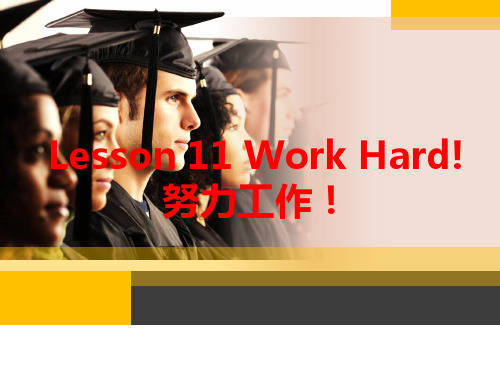
Yes, I do. I work hard at school, at home and at sports.
Important [ɪmˈpɔ:tnt] 重要的 It‘s important to do sth 做某事是重要的
三、我会选。
( A ) 1. She works hard ________ sports.
A. at
B. to
C. on
( C ) 2. We have fun ________our friends.
A. at
B. in
C. with
点拨: have fun with sb.和某人在一起很开心。
Lesson 11 Work Hard! 努力工作!
Work hard努力工作 hard (副词)努力地 (形容词)难做的,坚硬的 例句:The question is too hard. The desk is hard. She studies hard .
Warm-up
在运动方面都很努力。
Let’s talk
How does Jenny work hard at school?
go to school on time
do homework
How does Jenny work hard at sports?
High 高的,在高 处 Low 低的
do exercise every day have fun with friends
①You can do it !你能做得到!
Jenny, do you think it's important to work hard?
六年级下册英语冀教版翻译24课

六年级下册英语冀教版翻译24课亲爱的朋友你是不是想有一位无话不谈能推心置腹的朋友呢?或者你是不是担心你的朋友会嘲笑你,会不理解你目前的困境呢?安妮·弗兰克想要的是第一种类型的朋友,于是她就把日记当成了她最好的朋友。
安妮在第二次世界大战期间住在荷兰的阿姆斯特丹。
她一家人都是犹太人,所以他们不得不躲藏起来,否则他们就会被德国纳粹抓去。
她和她的家人躲藏了两年之后才被发现。
在这段时间里,她唯一的忠实朋友就是她的日记了。
她说,“我不愿像大多数人那样在日记中记流水账。
我要把这本日记当作我的朋友,我要把我这个朋友称作基蒂”。
安妮自从1942年7月起就躲藏在那儿了,现在,来看看她的心情吧。
亲爱的基蒂:我不知道这是不是因为我长久无法出门的缘故,我变得对一切与大自然有关的事物都无比狂热。
我记得非常清楚,以前,湛蓝的天空、鸟儿的歌唱、月光和鲜花,从未令我心迷神往过。
自从我来到这里,这一切都变了。
比方说,有天晚上天气很暖和,我熬到十一点半故意不睡觉,为的是独自好好看看月亮。
但是因为月光太亮了,我不敢打开窗户。
还有一次,就在五个月以前的一个晚上,我碰巧在楼上,窗户是开着的。
我一直等到非关窗不可的时候才下楼去。
漆黑的夜晚,风吹雨打,雷电交加,我全然被这种力量镇住了。
这是我一年半以来第一次目睹夜晚令人伤心的是我只能透过脏兮兮的窗帘观看大自然,窗帘悬挂在沾满灰尘的窗前,但观看这些已经不再是乐趣,因为大自然是你必须亲身体验的。
亲爱的王小姐:我同班上的同学有件麻烦事。
我跟我们班里的一位男同学一直相处很好,我们常常一起做家庭作业,而且很乐意相互帮助。
我们成了非常好的朋友。
可是,其他同学却开始在背后议论起来,他们说我和这位男同学在谈恋爱,这使我很生气。
我不想中断这段友谊,但是我又讨厌人家背后说闲话。
我该怎么办呢? Reading and writing 尊敬的编辑:我是苏州高中的一名学生。
我有一个难题,我不太善于同人们交际。
【冀教版】六年级下册英语:U3L17Danny's Summer Holiday
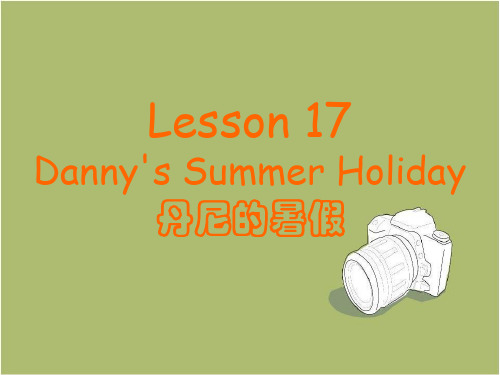
Lesson 17
New words:
clever /`klevə/ adj. 聪明的 近义词: smart 反义词: foolish forest /`f ɒrist/ n. 森林 also /`ɔ:lsəu/adv. 并且,也 camp /kæ mp/n.营地,阵营 summer camp 夏令营
will Freddie_______ go to summer camp this year. will not arrive in early June. He ________ He ________ meet students from will different countuies. will He________ go swimming. will He and the other students_______ learn about the animals and plants.
②Let's do it!
• Dear Uncle Peter, • 亲爱的彼得叔叔: • I will go to a summer camp this year! I will arrive with 20 ather students in early July. There will be students from China, the U.k, Australia and the U.S. • 今年我将要去参加一个夏令营。我和其他 20个学生将在七月初到达。有的学生来自 中国,有的来自英国,还有来自澳大利亚 和美国的。
①What will Danny do this summer? 今年夏天丹尼将要做什么?
What will you do this summer holiday,Danny? 今年暑假你将要做什么丹尼? Let's st summer,I learned to swim.And I also learned to fish.What will I do this summer? 让我想想。去年夏天我学会了游泳。 我还学会了钓鱼。今年夏天我将要做 什么呢?
【冀教版】 六年级下册英语-Unit 3Lesson15 Jenny's Summer Holida

冀教版六年级下册英语-Unit 3 Lesson 15 Jenny’s SummerHolidayTextPart 1Hello, I’m Jenny. I’m very happy to tell you about my summer holiday. In the summer holiday, I went to the countryside with my parents. The grass was green and the sky was blue. There were flowers and trees everywhere. It was very beautiful.Part 2We lived in a farm house. We had a lot of fun there. We went fishing in the river. We caught a lot of fish. We also picked apples and pears from the orchard. They were very sweet and juicy.Part 3We visited many places of interest around the farm. We went to a mountain and saw a waterfall. It was very high and it made a lot of noise. We also went to a lake and swam in it. The water was very clean and cool.Part 4We had a barbecue in the evening. My parents made delicious food and we ate a lot. After the barbecue, we sat around the campfire and sang songs. It was a lot of fun.Part 5The summer holiday was over too soon. I had to go back to school. But I will never forget the wonderful time I had in the countryside. I hope I can go there again next year.Vocabulary•countryside: 农村•grass: 草•blue: 蓝色的•flower: 花•tree: 树•farmhouse: 农舍•fishing: 钓鱼•river: 河流•apple: 苹果•pear: 梨•orchard: 果园•mountain: 山•waterfall: 瀑布•lake: 湖泊•swim: 游泳•barbecue: 烧烤•campfire: 篝火GrammarPast Simple TenseIn the text, Jenny is telling a story about her summer holiday. She uses the past simple tense to talk about things that happened in the past. For example, she says:•In the summer holiday, I went to the countryside. (go)•We caught a lot of fish. (catch)•We also went to a lake and swam in it. (swim)The past simple tense is used to talk about actions or events that happened in the past and are now finished. It is formed by adding -ed to the base form of regular verbs. For irregular verbs, the past simple tense form is different. Some examples of irregular verbs are:•go - went•catch - caught•swim - swam•make - made•sing - sangAdjectivesJenny uses adjectives to describe the things she saw and did during her summer holiday. For example:•The grass was green and the sky was blue. (green, blue)•We also picked apples and pears from the orchard. They were very sweet and juicy. (sweet, juicy)•We went to a mountain and saw a waterfall. It was very high and it made a lot of noise. (high, noisy)Adjectives are words that describe or modify nouns or pronouns. They give more information about the noun or pronoun they are describing. Adjectives can come before or after the noun they are describing. Some examples of adjectives are:•green•blue•sweet•juicy•high•noisyConclusionJenny had a wonderful summer holiday in the countryside. She did a lot of fun things with her parents and saw many beautiful sights. She used the past simple tense to talk about the things she did and adjectives to describe the things she saw.。
河北省英语第23课翻译六年级下册

河北省英语第23课翻译六年级下册Today’s weather very good,God deliberately arranged. This particular day,blue skies,the number of words Happy Mother‘s Day reverberated in the ears.From early in the morning,I mope,because it can not think of what gift to give mother. Later,I came up with in my opinion the best gift for mother. First to see Mother,I sang loudly: Mother,Mother‘s Day Happiness! The world is only a good mother,there is the mother of the child as-bao block. Singing,leaves itself a son and mother’s arms,dropped into the embrace of mother,and ultimately,happy ……Mother died in Iraq last year,with deep feeling with me,Staring at me,eyes full of love and caress. Looked thoughtful,I grew up my mother smile ……Mother,in fact,you know,daughter wanted to tell you there is worth a thousand words,but there are also all into this beautiful melody,which Beat notes the go. Here not only has his daughter’s aspirations,more daughters are infinite gratitude to you,sincere love.People will have a total support of our total love for us there is a touching,heartbreaking. Ah! Mother,you like anumbrella,an umbrella unusual. Summer,for me keep off the sun,winter,let me escape the harsh wind and snow.翻译:今天的天气真好,是上帝刻意安排。
Lesson8AlwaysBrushYourTeeth(课件)冀教版英语六年级下册
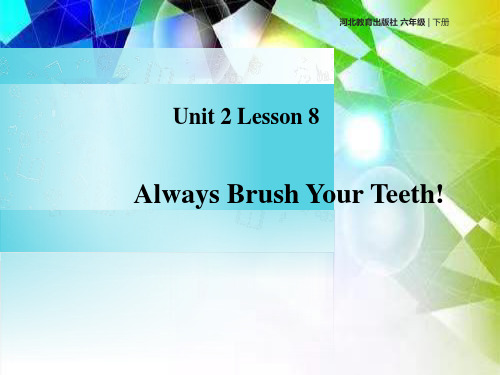
般过去时 。
tooth ( 复数)_te_e_t_h__ go (第三人称单数)g_o_e_s___ before (反义词)_a_ft_e_r __ wake (现在分词)_w_a_k_in_g__
2.What time does Jenny get up ?
3.Does Jenny work hard?
4.Does Jenny go to school on Saturday and Sunday?
Jenny goes to school five times a week. She gets up at 7:00 in the morning . First, she washes her hands and face, and then she brushes her teeth. Next, she has breakfast.Then she goes to school . She works hard at school . Saturday and Sunday are different . Jenny doesn't go to school on those days .
她早上7:00起床。首先,她洗手和脸,然后刷牙。
Next, she has breakfast. Then she goes to school.
接下来,她吃早餐。然后,她去上学。
She works hard at school.
她在学校学习很努力。
1.How often does Jenny go to school ?
六年级下册英语-Unit1 Lesson 2 At the Store Shop 冀教版

六年级下册英语-Unit1 Lesson 2 At the Store Shop 冀教版课文梗概这一课主要讲述了女孩Nancy和男孩Tom在商店购物的情景。
他们一起去商店,买了一些薯片和饮料,接着去了糖果店,从糖果店买了糖和巧克力。
在离开商店时,Nancy不慎将口香糖遗失,Tom却表现得很成熟,告诉她不要担心,可以再买一包。
生词解析•At the store shop: 指商店。
•potato chips: 薯片。
•cola: 可乐。
•candy: 糖果。
•chocolate: 巧克力。
•lose: 丢失。
•again: 再一次。
课文详解这一课的主要场景是商店。
文中描述了两个小孩Nancy和Tom一起去商店,他们不仅购买了薯片和饮料,还去了糖果店。
他们非常开心地挑选糖果和巧克力,但在走出商店时,Nancy不小心丢失了口香糖,十分沮丧。
这时,Tom走到她身边,告诉她不要担心,可以再买一个。
这让Nancy感到很温暖,也让我们看到Tom的成熟和理解。
最后,两个小孩挽着手一起走出了商店。
课文互动这一课是非常值得互动的一节课。
老师可以让学生进行以下活动:1.角色扮演:让学生分成小组,扮演Nancy和Tom,模拟他们在商店中购物的情景。
这样可以帮助学生更好地理解课文中的内容,并加深对词汇的理解。
2.绘画:让学生分成小组,画出商店的场景。
这不仅可以锻炼学生的画画技巧,还可以让他们更好地了解商店的一些物品。
3.情景演绎:学生们可以按照自己的理解,表演课文中的情节。
这样可以帮助学生更好地掌握对话的语音语调,以及更好地了解对话的文化背景。
4.回答问题:教师可以针对课文的内容提出一些问题,让学生进行回答。
这样可以帮助学生更好地理解和掌握课文的知识点。
词汇梳理1.to the store shop:意为“去商店”。
2.potato chips:指薯片。
3.some cola:意为“一些可乐”。
4.a candy store:意为“糖果店”。
六下英语第七课冀教版范文

六下英语第七课冀教版范文The seventh lesson in the sixth grade English textbook of Jilin Education Press is about the story of a squirrel and a hedgehog. 这本教科书的第七课讲述了一只松鼠和一个刺猬的故事。
The story is not only interesting but also teaches students the importance of kindness and teamwork. 这个故事不仅有趣,而且教给学生们善良和团队合作的重要性。
It begins with the squirrel discovering a hedgehog lying on the ground, injured and in need of help. 故事从松鼠发现一个受伤倒在地上需要帮助的刺猬开始。
Despite being afraid of the prickly hedgehog, the squirrel decides to help and eventually earns the trust and friendship of the hedgehog. 尽管对多刺的刺猬感到害怕,松鼠还是决定帮助,并最终赢得了刺猬的信任和友谊。
This story teaches children the valuable lesson that kindness and empathy can bridge differences and foster connections between individuals. 这个故事教给孩子们宝贵的一课,即善良和同理心可以弥合差异,促进个体之间的联系。
It shows that by showing compassion and care for others, we can build meaningful relationships and make a positive impact on the world around us. 它表明,通过向他人表达同情和关心,我们可以建立有意义的关系,并对我们周围的世界产生积极影响。
- 1、下载文档前请自行甄别文档内容的完整性,平台不提供额外的编辑、内容补充、找答案等附加服务。
- 2、"仅部分预览"的文档,不可在线预览部分如存在完整性等问题,可反馈申请退款(可完整预览的文档不适用该条件!)。
- 3、如文档侵犯您的权益,请联系客服反馈,我们会尽快为您处理(人工客服工作时间:9:00-18:30)。
Lesson4 Did you have fun?1.您们今天玩得开心吗?就是得,我们玩得开心。
2.我们去了一个商店。
李明今天买了一件T恤衫。
3.我们打乒乓球了。
我教詹尼击球了。
丹尼也想击球,但就是她打到了她得手。
4.我们也打篮球了。
我教李明投球与接球了。
她就是一名不错得篮球运动员。
5.丹尼也学习打篮球了吗?6.就是得,她也学习打篮球了。
但就是她认为篮球太重了。
她用乒乓球打篮球!7.詹尼与李明经常在这家商店买东西。
8.今天上午,詹尼与李明在这家商店买东西了。
Lesson 5 A Basketball Game1.您们今天晚上做什么了?2.我们观瞧鲍勃打篮球了!3.鲍勃得球队打比赛了吗?就是得,她得球队与橙队打得比赛。
那就是一场非常好得比赛。
每个人都努力地打。
4.谁赢了?鲍勃得球队赢了。
5.您们玩得开心吗?就是得。
我们为鲍勃得球队呐喊!6.鲍勃每天都打篮球吗?不,她就是一名警察。
她在星期六与星期日打篮球娱乐。
7.她今天晚上打得那么好。
她就是一名不错得运动员。
Lesson7 Always Have Breakfast1.每个人都想变得健康与强壮。
我们怎样才能变得健康与强壮呢?首先,一直吃早餐。
它对您们有好处!2.上周丹尼与金姆多久吃次早餐?上周丹尼吃了一次早餐。
她什么时候吃得早餐?3.上周金姆吃了六次早餐。
做得好,金姆!4.您一直吃早餐吗?就是得。
我一直吃早餐。
Lesson 8 Always Brush Your Teeth!1.李明在早上7点吃早餐。
早餐前,她洗手并刷牙。
早餐后,她去上学。
2.丹尼晚餐后从不刷牙。
那对她得牙齿有害。
3.詹尼一周去上学五次,从星期一到星期五。
4.她早上7点起床。
首先,她洗手与脸,然后她刷牙。
接下来,她吃早餐。
然后她去上学。
她在学校努力学习。
星期六与星期日十不同得。
詹尼在那些天不去上学。
5.早餐前您做什么?我刷牙6.为什么?因为我想要兼顾健康得牙齿。
Lesson9 Eat More Vegetables and Fruit1.丹尼多久吃一次水果与蔬菜?让我们瞧一瞧。
2.我不太喜欢蔬菜。
我一周大约吃两次土豆与西红柿。
3.您多久吃一次水果?一周三次。
4.您多久吃一次面包圈?5.一天两次。
午餐后与晚餐后。
6.您需要吃更多得蔬菜与水果。
她们对您有好处!7.谢谢您。
我认为我需要吃更多得蔬菜与水果。
一日一苹果医生远离我!Lesson10 Exercise1.骑自行车就是锻炼。
步行就是锻炼。
打乒乓球就是锻炼。
跑步就是锻炼。
锻炼帮助您得身体变得健康与强壮。
2.您多久锻炼一次?我早上步行去学校,放学后步行回家。
3.那就是一天两次。
您步行多少分钟?大约五分钟。
4.我认为您一天需要大约一小时得锻炼。
好得,我打算在电视上观瞧更多得运动,不,丹尼!您需要靠做运动来锻炼!5.锻炼帮助我们得身体变得更健康与强壮。
我每天早上跑二十分钟。
乒乓球就是我最喜欢得运动。
我一周打三次乒乓球,那就是一周一个半小时。
我一周打两次篮球,那就是一种锻炼两个小时。
我一周锻炼多少分钟?Lesson 11 Work Hard1.您认为努力学习重要吗?就是得,我认为重要。
我在学校在家与在运动方面都很努力。
2.我总就是准时上学。
我总就是作家庭作业。
我每天锻炼!我与我得朋友们玩得开心。
我帮助我父母。
我打扫我得卧室。
3.您帮助您得家人吗?就是得,我晚餐后总就是擦干盘子。
我在家总就是浇花。
那很好。
4.您在家还做什么?我在星期六打扫我得卧室。
在我去上学之前,我总就是做我得午餐。
Lesson 13 Summer is Coming1.在冬天天气寒冷且多雪。
许多树没有叶子。
2.在春天。
天气温暖。
树木有新得叶子。
3.夏天天气很热。
树木有绿色得叶子。
4.在秋天,树木失去了她们得叶子。
那些叶子就是什么颜色得?黄色得,橙色得与红色得。
5.我喜欢夏天!在夏天我喜欢游泳。
我喜欢坐着晒太阳。
夏天很热。
我喜欢风扇,她很凉爽,6.有时我与我得朋友们做运动。
有时我放风筝。
有时我喜欢瞧云。
Lesson 14 Tomorrow We Will Play1.明天就是星期六。
我们将要做什么?我们将要去公园我们将要放风筝。
2.我不要放风筝。
我将要瞧公园漂亮得花。
3.我将要给我妈妈摘一些花。
您不能摘公园里得花。
4.我将跑回家关上门。
那就是不对得。
对不起别生气。
我不会那么做得。
Lesson 15 Jenny’s Summer Holiday1.您暑假将要作什么。
我家人喜欢在夏天去旅行。
2.去年夏天,我与我得祖父祖母区里湖边。
我在湖里游泳了。
3.我在沙滩上玩耍了。
我喜欢在沙滩上玩耍。
4.今年夏天,我们将要去海边旅行。
我将要在海里游泳。
5.我将要观瞧海面上得轮船与小船。
6.詹尼去年夏天做什么了?詹尼与谁一起去得?詹尼今年夏天将要做什么?詹尼将要观瞧海面上得什么?Lesson 16 Li Ming’s Summer Holiday1.您暑假将要做什么?在6月25日,我将要乘飞机回家。
我将要在中国度过暑假。
2.我将要向我得爸爸与妈妈问好。
3.我将要拜访我得婶婶与叔叔。
我将要与我堂妹晶玩耍。
4.我将要与我得朋友们见面。
我将要与她们打乒乓球。
5.我会想念加拿大得,但就是再次见到中国我将会感到很开心。
6.丹尼与我也会想念您得。
我们将会给您打电话。
Lesson 17 Danny”s Summer Holiday1.今年暑假您将要做什么?让我想想。
去年夏天,我学习游泳了。
我还学习钓鱼了。
今年夏天我将要做什么呢?2.您将要在海里游泳吗?不,我将不在海里游泳。
您将要拜访您得亲属吗?就是得,我将要拜访您得亲属吗?就是得,我将要拜访我得亲属。
我将要拜访我得外祖父与外祖母。
她们住在一个非常大得森林附近。
3.您还将要做什么?我还将要学习飞行。
真得吗?您为什么学习飞行?我将要飞到中国。
4.我将要与李明一起玩。
那将会很有趣。
非常聪明。
Lesson 19 Buying Gifts1.李明将要在下星期乘飞机回家,她想要给她得家人买一些礼物。
2.您需要多少礼物?我需要十一份礼物。
我需要给家里每个人一份礼物。
3.这里有一些小旗子。
好主意!我将要买三面。
4.这些帽子怎么样?好得,我要买四定。
瞧这些T恤衫。
这些就是来自加拿大很棒得礼物。
太好了!并且我想给我表妹一个玩具。
Lesson 20 Looking at Photos1.您正在做什么?我正在为下周回家做准备。
2.瞧,我发现了这些照片!我可以瞧瞧她们吗?当然。
3.瞧这张照片。
丹尼想要用乒乓球打篮球、丹尼说篮球很重。
然后我教她打乒乓球,但就是她打到了她得手。
可怜得丹尼!4.瞧!这里有一张您,丹尼与圣诞老人得照片。
您记得吗?5.就是得,我与丹尼去了商店。
我们买了圣诞礼物。
然后我们瞧到了圣诞老人。
我们与圣诞老人交谈了。
Lesson 21 A Party for Li Ming1.李明很快就要离开了。
让我们为她举办一个告别聚会吧。
2.好得,我将邀请一些朋友。
3.我们要告诉李明关于聚会得事情吗?不让我们为她举办一个惊喜聚会!4.您想要来参加为李明举办得聚会吗?当然,聚会在什么时候?明天。
它就是给李明得一个惊喜。
请不要告诉她。
5.好得。
聚会什么时候开始? 在下午四点。
不要迟到!我们想要李明感到惊喜!好得,我将在四点之前来。
那么我将会早到。
太好了。
明天见。
6.有多少人来参加聚会?让我想想。
九个。
Lesson22 Surprise1.今天就是李明得惊喜聚会。
史密斯先生与李明正在购物。
史密斯先生将要在四点带李明回家。
那就是聚会开始得时间、史密斯先生知道这个聚会,但就是李明不知道。
2.丹尼打开门。
您们需要帮忙吗?丹尼,詹尼与斯蒂芬做了一个漂亮得蛋糕与九个小甜饼。
瞧!每个小甜饼上都有字母。
3.这个就是给我得。
4.在三点四十五分,所有人到达了聚会,但就是金姆没有。
哦!她来了。
她去商店买了一些冰激凌。
Lesson 23 Good--bye!1.李明将要动身前往中国了。
她有一个惊喜给詹尼,一个惊喜给丹尼,飞往北京得飞机很快就要离开了。
您们听到了吗?我该走了。
2.她就是一个很棒得中国风筝。
您能放飞她!我知道您能。
3.您就是一个很棒得朋友。
4.我想要您记住中国。
我不会忘记中国得!。
